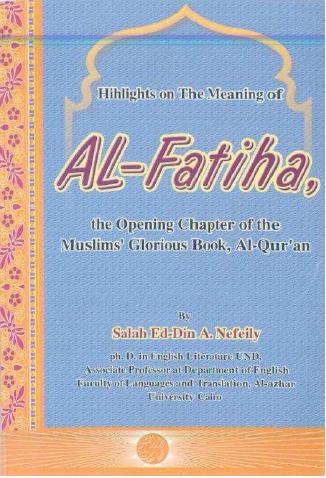Highlights On the meaning of Al-Fatiha

Sura Al –Fatiha
Verse One:
بِسْمِ اللّهِ الرَّحْمَنِ الرَّحِيمِ
"ln the Name of Allah, the All and Ever-Merciful, the
Compassionate?
This verse begins all chapters of the Qur'an except for chapter nine
which does not start with this verse. However, it is considered as an
introductory verse to the chapters except for Al-Fatiha in which it is counted
as a full verse. The first verse of the Qur'an revealed to the Prophet Muhammad
teaches us that we should start our reading of the Qur'an with the name of
Allah:
اقْرَأْ بِاسْمِ رَبِّكَ الَّذِي خَلَقَ {العلق/1}
"Read in the name of your Lord" (96:1). Being in the companionship
of Allah, the reader of the Qur'an hopes to understand some of the secrets of
the Qur'an. As a matter of fact, Allah teaches Muslims that they should observe
His presence in all of their actions. ln Sura 18, Allah establishes this
principle at the hearts of Muslims. He says;
وَلَا تَقُولَنَّ لِشَيْءٍ إِنِّي فَاعِلٌ
ذَلِكَ غَدًا {الكهف/23} إِلَّا أَن يَشَاء اللَّهُ
وَاذْكُر رَّبَّكَ إِذَا نَسِيتَ وَقُلْ عَسَى أَن يَهْدِيَنِ رَبِّي لِأَقْرَبَ مِنْ
هَذَا رَشَدًا {الكهف/24}
"And never say of anything 'l shall do such a thing tomorrow except
with saying if Allah will" (23-24). The fact that one will remember Allah
before taking any decision will discourage him from doing evil. He will be ashamed
to do wrong if he has to remember his Lord beforehand.
The word 'Allah' is unique in Arabic. lt has no dual case nor does it
have a plural. It has no feminine case as most nouns in Arabic do. Hence, its
very morphological structure implies the oneness of Allah. The word 'Allah' refers
to a concept, which is completely different from the Greco-Roman concept of
God. The Greeks and Romans knew different gods for different concepts in life.
They had a god of war, a goddess of nature, etc.
The word "Allah" can be divided into two words, /aala/ and
/lahu/. The first word means "goes back" and the second one means
"to him". The combination of the two words means that Allah is the
one to whom everything goes back and relies on. The word /Allah/ also refers to
the word /walaha/ in Arabic which means 'to love intensely'. It is a kind of
love, which brings peace of mind to the person who feels it. Verse 28 of Sura
13 reads:
أَلاَ بِذِكْرِ اللّهِ تَطْمَئِنُّ الْقُلُوبُ {الرعد/28}
"Verily, in the remembrance of Allah do hearts find rest". Allah
encourages people to seek refuge in Him. He says:
فَفِرُّوا إِلَى اللَّهِ{الذاريات/50}
“So flee to Allah” (51:20).
ln the first verse of Sura Al-Fatiha the name 'Allah' is used to refer
to the Super Being Who is worthy of being worshipped. lt is the name which
implies all other names and attributes of Allah.
The word 'Ar-rahman' which is translated here as 'the All and Ever
Merciful' is an intensive form of the word "rahma," meaning general
mercy. The word 'Rahim', translated here as the Compassionate, refers to the
mercy of Allah which He exercises on people on the Day of Judgment. The first
word /rahman/ is more inclusive because it refers to Allah's exercise of mercy
in this life and in the After-life. It is more general than the adjective
/rahim/ because it covers the good and the bad, whereas the word /rahim/ refers
to Allah's mercy on the Day of Judgment which He exercises only on those who deserve
it. Sheikh Tantawi Johary explains that the word /rahman/ o refers to Allah's
great blessings as the creation of earth and the sky and that the word /rahim/
refers to the minute and specific blessings as shaping eyelashes in a way that
permits light to go through them and prevents dust from penetrating them. (26).
the word /rahman/ is used only in connection with Allah, whereas the word /rahim/
may be applied to Allah and to human beings. The word /rahim/, for example, is
used in verse 128 of Sura 9 to describe the Prophet Muhammad in his relationship
with believers.
A Muslim is urged to praise and to thank Allah whenever he remembers any
of Allah`s blessings. Thanking Allah for His blessings makes a Muslim aware of
the proper use of these blessings. Whenever he remembers the blessing of sight,
for example, he thanks Allah for it. He will also know that Allah can take it
away any time. He should then make good use of it before it is gone. When Allah
is pleased with the way a person uses the blessing, He will keep His blessings
with the person and will give him more. Allah says:
وَإِذْ تَأَذَّنَ رَبُّكُمْ لَئِن شَكَرْتُمْ
لأَزِيدَنَّكُمْ وَلَئِن كَفَرْتُمْ إِنَّ عَذَابِي لَشَدِيدٌ {إبراهيم/7}
"If you give thanks for my blessings, I will give you more of them,
but if you are thankless, then I may send my wrath on you" (I4: 7). A
Muslim knows that all the blessings he enjoys are from Allah. In sura I6, verse
53
Allah says:
وَمَا بِكُم مِّن نِّعْمَةٍ فَمِنَ اللّهِ{النحل/53}
"And whatever of blessings and good things you have, it is from
Allah".
